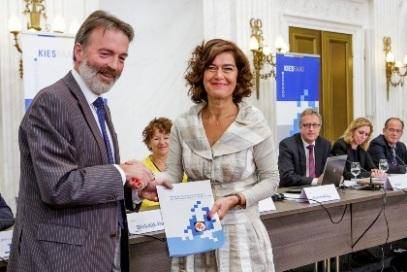Results of the elections for members of the European Parliament of 22 May 2014
On Thursday, 22 May, 4,782,251 of the 12,815,496 persons entitled to cast a vote in the elections for the Dutch members of the European Parliament have cast theirs, meaning the turnout percentage for the 2014 elections (37.3%) was slightly higher than the 2009 figure (36.8%). Schiermonnikoog had the highest turnout (70.95%). St. Eustatius had the lowest turnout (7.44%).

In total, 4,753,746 valid votes were cast. 16,786 voters (0.4%) cast a blank vote. 11,719 invalid votes were cast (0.2%). The number of votes required to secure a seat is referred to as the electoral quota. This number is calculated by dividing the total number of valid votes cast by 26, the total number of Dutch seats in the European Parliament. So the electoral quota amounted to 4,753,746 : 26 = 182,836 10/26.
Allocation of seats
The 26 seats were allocated as follows:
CDA - European People's Party: 5 (2009 figure: 5)
PVV (Partij voor de Vrijheid): 4 (2009 figure: 5)
P.v.d.A./European Socialists: 3 (2009 figure: 3)
VVD: 3 (2009 figure: 3)
Democraten 66 (D66) - ALDE: 4 (2009 figure: 3)
GROENLINKS: 2 (2009 figure: 3)
SP (Socialistische Partij): 2 (2009 figure: 2)
ChristenUnie - SGP: 2 (2009 figure: 2)
Partij voor de Dieren: 1 (2009 figure: 0)
The other parties participating in the elections failed to secure a single seat:
Artikel50
IQ, de Rechten-Plichten-Partij
Piratenpartij
50PLUS
De Groenen
Anti Eu(ro) Party
Liberaal Democratische Partij
JEZUS LEEFT
Ikkiesvooreerlijk.eu
Aandacht en Eenvoud
Allocation of residual seats
In allocating the 26 seats over the 19 participating parties, each of the parties and the two combined lists were first allocated a number of 'full seats'. This number is equal to the number of times the party or combined list managed to meet the electoral quota. 22 full seats were allocated in this first round. This therefore left 4 residual seats to allocate. Two residual seats were allocated to the CDA - European People's Party – ChristenUnie-SGP combined list. The two separate parties were each allocated one residual seat. The residual seat allocated to the P.v.d.A. – GROENLINKS combined list was allocated to P.v.d.A/European Socialists. The final residual seat was allocated to PVV (Partij voor de Vrijheid).
Combined lists
The Electoral Council also calculated how the seats would have been allocated if no combined lists had participated. If such would have been the case, one more seat would have been allocated to CDA - European People's Party, and one less to SP (Socialistische Partij).
Candidates
In total, the lists of the 19 parties participating in the elections contained 345 candidates: The youngest candidate elected to the European Parliament is Ms V. Maeijer (PVV (Partij voor de Vrijheid)), aged 27, and the oldest is Mr B. Belder (ChristenUnie-SGP), aged 67. Of the 26 elected candidates, 15 are men, and 11 are women. For each list, those candidates who received a number of preference votes amounting to more than 10% of the electoral quota were declared elected first. This percentage is referred to as the preference threshold. The preference threshold stood at 18,284 votes. All other seats allocated to a party were allocated to candidates in their list order.
Preference threshold
Of the 23 candidates receiving a number of preference votes in excess of the preference threshold, 5 were elected in spite of their being positioned lower on the relevant list: Ms J.M.G. Schreijer-Pierik (CDA-European People's Party), Mr L.J.J. van Nistelrooij (CDA-European People's Party), Mr G. Wilders (PVV (Partij voor de Vrijheid)), Mr J. Huitema (VVD) and Ms A.C. Mineur (SP (Socialistische Partij)). Five other candidates did meet the preference threshold, but failed to secure a seat, as too few seats were allocated to the lists they were listed on: Ms C.M.A.W. Nagtegaal-van Doorn, for VVD (19,370 votes), Ms S.J.F. van der Graaf, for ChristenUnie-SGP (23,429 votes), Mr M.A. Pontier, for Piratenpartij (30,507 votes) and Messrs A.J.M. Manders and H.C.M. Krol, for 50PLUS (112,521 and 23,125 votes, respectively).
Core data
For those interested in the number of preference votes cast for candidates, irrespective of whether they were elected: these data are available in the Electoral Council's publication Core data of the 2014 European Parliament Elections results. This publication also contains information like the number of registered voters casting their vote abroad, or which candidates have been elected to the European Parliament for the first time.